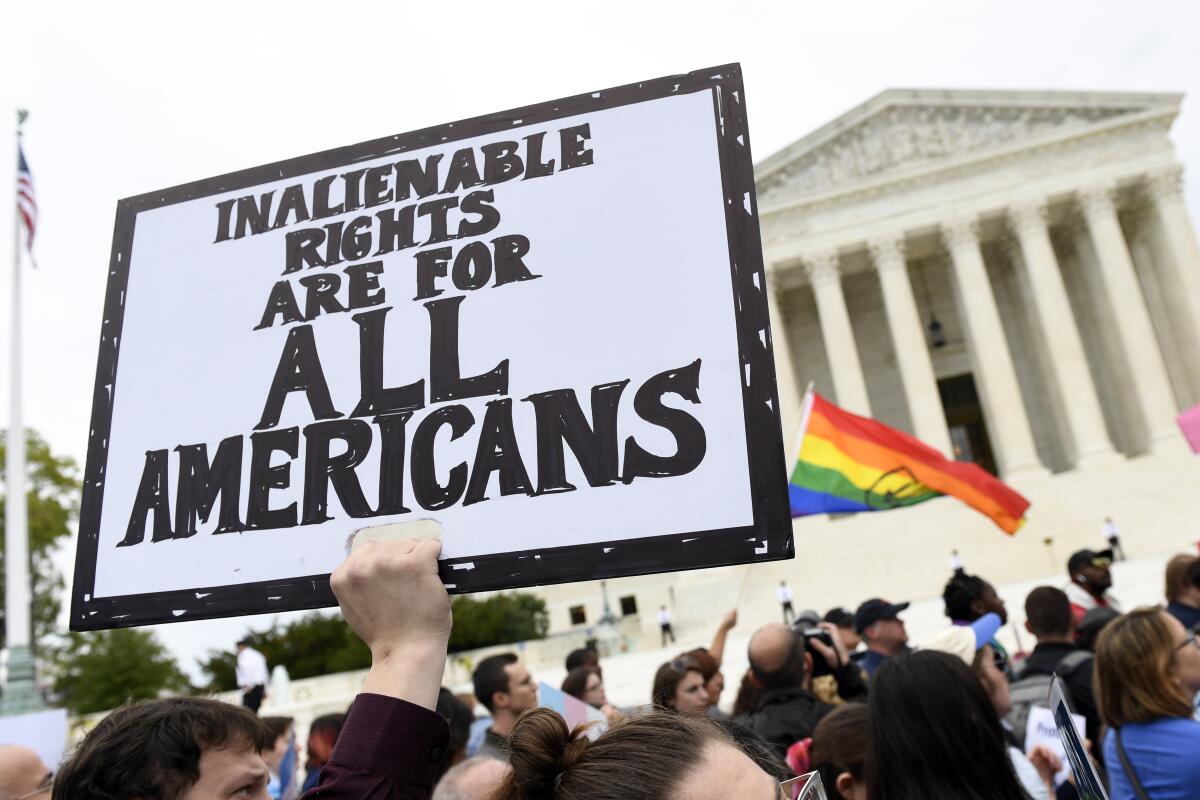Column: A historic bill for LGBTQ rights, but will the pendulum swing again?

- Share via
The year is 2021. Watches record our steps, cars park themselves, helicopters fly on Mars. Yet, despite all of these advancements, when it comes to human decency, the nation still reeks of the Dark Ages.
This week the House is expected to vote on the Equality Act, a bill that would make it illegal to discriminate based on someone’s sexual orientation and/or gender identity. Believe it or not, it is still legal to fire or refuse housing to someone simply for being LGBTQ in 27 states. The bill was also introduced in the Senate this week and if passed, President Biden is expected to sign it into law.
Last year, Tennessee made it legal for publicly funded adoption and foster care agencies to turn away would-be parents simply for being LGBTQ. That was just one of the 185 anti-LGBTQ bills across 35 states that were introduced in 2020 alone, in case you thought the fight was over after marriage equality was achieved.
“When we achieve landmark success there is a risk that people conclude the fight is over,” said Alphonso David, president of the Human Rights Campaign. “But the journey to achieve justice is not tied to one piece of legislation or court ruling. We’ve passed a number of laws designed to help America fulfill her promise, but the struggle continues. We all have to be collectively invested in the continual fight for equality.”
Case in point: Even after the Supreme Court ruled in 2013 that the federal government has to recognize the marriages of same-sex couples if those unions are legal in their home states, Sen. Ted Cruz (R-Texas) reintroduced the State Marriage Defense Act in 2015 to support the right of states to outlaw same-sex marriage. It was co-sponsored by 11 other senators, including Jeff Sessions, who would become attorney general two years later.
The Equality Act, if passed by Congress and signed by President Biden, would amend the Civil Rights Act of 1964, which is a descendent of the Civil Rights Act of 1960, which is related to the Civil Rights Act of 1957, which followed the Civil Rights Act of 1875, which got its start from the Civil Rights Act of 1866. That’s 155 years of Congress and the White House trying to figure out what “all men are created equal” means.
Yet, in more than half the country today, a person can be kicked out of a store solely for being LGBTQ and there is no federal recourse. Apparently, teaching Alexa how to be more human is easier than teaching one another how to be humane.
Why else would Roger Severino remove nondiscrimination protections for LGBTQ people when it comes to health insurance and healthcare when he was director of the Office for Civil Rights in the Department of Health and Human Services? Why else would Ben Carson float the idea of allowing publicly funded shelters to deny transgender people who are homeless when he was in charge of HUD?
If it becomes law, the Equality Act would go a long way in terms of protecting LGBTQ people who are currently being targeted by elected officials. But that law and those protections are on the same pendulum that swung in the case of other civil rights acts, also promising more freedom and more equality. There will be legislative responses, lawsuits and politics — with the last being the most worrisome.
The Stonewall riots — which gave birth to the modern gay rights movement — occurred in New York City in 1969, but because of politics the City Council did not pass a gay rights bill until 1986. A version of the Equality Act called the Employment Non-Discrimination Act was first introduced in Congress in 1994 and has been modified, ignored and modified again. More than two decades of stalling just to have Rep. Marjorie Taylor Greene (R-Ga.) take to Twitter to call the Equality Act “evil” and then repeat this rhetoric on the floor as if keeping foster children out of loving homes because of bigotry is moral.
The Equality Act — which was initially approved by the House in 2019 but ignored by then-Senate Majority Leader Mitch McConnell — is the most substantive piece of pro-LGTBQ legislation in history. It modernizes the Civil Rights Act of 1964 by updating the definition of public spaces. And one of its provisions would prohibit excluding LGBTQ people from jury service, because nothing is too mundane for anti-LGBTQ bigotry.
With Democrats in control of Congress and Biden in the White House, there is reason for optimism within the LGBTQ community that this time things will be different.
But I worry that social justice is never a straight line. Sometimes it’s two steps forward, one step back. And when you look at the dozens of voter suppression laws Republicans have introduced since November — including the insidious one in Georgia that would ban early voting on Sundays, a day that Black churches have used to increase voter participation with “Souls to the Polls” efforts — it is clear that the forces of bigotry and exclusion are not conceding anytime soon.
The year is 2021. Refrigerators offer recipes based on the food inside, the cloud is the new photo album and we’re still putting one another’s dignity up for a vote.
So much has changed and so much still needs to. This is why this week’s House vote is both a sign of progress and a warning that the work is nowhere near ended.
@LZGranderson
More to Read
A cure for the common opinion
Get thought-provoking perspectives with our weekly newsletter.
You may occasionally receive promotional content from the Los Angeles Times.











